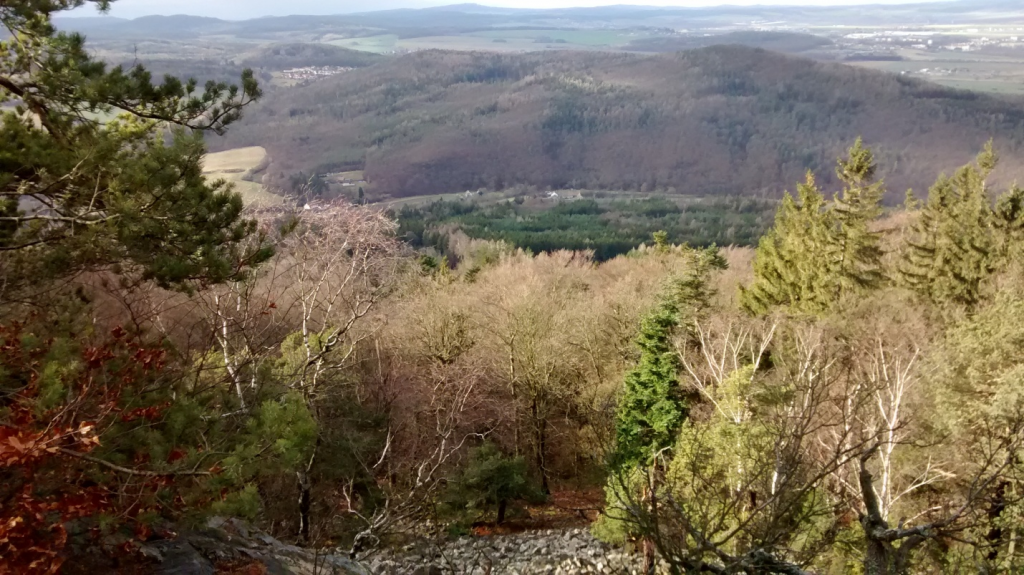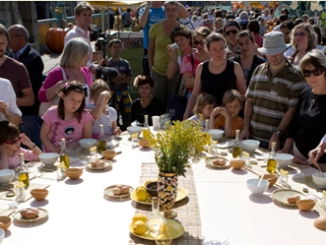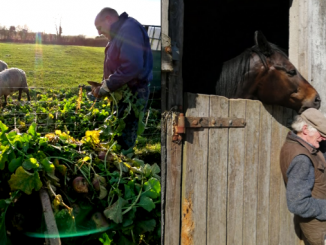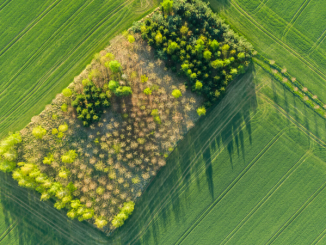
By Louise Kelleher in the Czech republic
Record droughts across Europe have been compounded in the Czech Republic by a plague of bark beetle that has jeopardized the nation’s forests. In a country where forestry and farming go hand in hand, every tree lost is a blow to the land, scuppering the soil’s capacity to store water and leaving it more vulnerable to erosion. To make matters worse, the vast fields of rapeseed that have become ubiquitous to Czech agriculture in recent years thanks to generous EU subsidies for biofuels have left the topsoil in a sorry state. In part one of this series we dig into the troubled ecology of soil, forests and water. In part two we’ll look at how history, politics and policy have shaped the lie of the land.
The warning signs of climate breakdown are becoming harder to ignore in the Czech Republic. After five consecutive years of drought, one bioclimatologist predicts that groundwater could dry up by early summer. As farmer Daniel Pitek puts it: “Rain these days is like an ambulance. You’re kept alive but you’re still sick. It revives the crops but it’s only first aid.” Droughts have impacted much of Europe, but Czech resilience is weakened by the fallout from four decades of Communist rule and a swarm of bugs in the ecosystem.
Uprooting the water cycle
At 34% woodland coverage, the Czech Republic is one of the most forested nations in Europe. But more than one-third of Czech forests are under threat from the worst infestation of bark beetle in history. In a healthy forest ecosystem the bark beetle is not a threat. But the immune systems of spruce trees have been weakened by year after year of droughts, leaving them defenceless as they are stripped bare by the bug. Intensive monocultures of spruce – the darling of the Czech timber industry – only serve to exacerbate the crisis. 80% of trees have been attacked in Vysočina, one of the worst hit regions in the country. The extent of the devastation so far can be seen in aerial footage of central and south-eastern Bohemia filmed on June 18 by forestry trade magazine Lesnická práce and published by news server Seznam Zprávy.
Some 1 million hectares of forest are at risk, warns the Czech Forest Owners’ Association (SVOL). Deforestation on such a scale could have “extremely grave repercussions” on the water cycle: fluctuating temperatures, less water vapour (meaning less precipitation), a significant loss of water retention capacity in the soil, more erosion and a greater risk of flooding, as well as poorer water quality at the source. The association is petitioning the government for what it describes as a “Marshall Plan for forests”: €116 million by the end of the year to replenish damaged forests, plus a further €194 – €271 million for 2020. “Students all over Europe marched in May to protect the climate and the future of the planet. If there are no forests, there will be no water and there will no future,” cautioned Richard Podstatzký, Chair of the Forest Owners Chamber (Komory soukromých lesů).
Over at the Ministry of Agriculture meanwhile water is “number one priority”. Minister Miroslav Toman has promised a series of soundbite-friendly initiatives to mitigate the effects of drought on farmland: “a pond a day” (restoring or building one new pond every day for the next three years), reducing red tape for installation of rainwater harvesting systems, and cash payouts for farmers. In the wake of the 2018 droughts over 13,000 farmers applied for financial assistance – four times more than the previous year – and a total of €77.43 million was paid out. About half of the payouts went to animal feed producers in the first tranche. The second tranche of payouts, for growers of food crops, left some farmers disappointed: the window for submitting applications had to be cut short when demand exceeded the budget by almost €10 million.
Digging deeper -Soil Matters
In addition to the financial burden on farmers, drought is taking its toll on the land. But lack of rainfall isn’t the problem, says agrarian analyst Petr Havel. In fact precipitation levels in the Czech Republic are enough to meet demand up to 30 times over, he told a conference on drought and climate change in Prague in June, reports Ekolist news server. According to Havel, annual precipitation is approximately 55 to 60 billion cubic metres (BCM) compared to 1.5 BCM of water consumed. “Farmland has the potential to retain 8.5 billion cubic metres but Czech farmland in reality retains far less. We need reservoirs, but even more wetlands.” Havel stresses that the blame lies firmly with the agricultural sector, not consumers: “The Czech Republic currently has the lowest daily water consumption in the whole of the European Union.”
So how is all this rainwater vanishing into thin air? Soil compacting is a serious concern, notes Radomil Hradil, Vice Chair of the Soil Foundation (Nadace Pro půdu). In up to 50% of Czech farmland the soil is so compacted that water cannot seep into the ground, he tells Ekolist news server. “It’s an alarming situation.” The Soil Foundation’s mission is to save the soil from speculators by buying up farmland and leasing it back to farmers who agree to comply with sustainable methods. The Soil Foundation currently holds some 400 hectares, much of which it received as donations, and hopes to expand its holdings nationwide.
Another issue is soil biomass. The soil is dead in vast swathes of the Czech Republic, says Professor Oldřich Syrovátka, a biologist and zoologist at the University of Economics Prague. Organic matter in the soil acts like a sponge, he explains to iDnes news server. But much of the fauna in the soil has been killed off by agrochemicals. A lack of organic matter reduces the soil’s capacity to hold onto water, and any water that does seep in is flushed into the sub-soil. Scientists are wringing their hands over disappearing insect populations, he comments wryly, but it’s no surprise when you look at the state of the soil which is home to the majority of insects.
The rate of soil erosion in the Czech Republic is markedly above the EU average. 18% of land is under serious to very serious threat of water erosion –compared to 11.4% under mild to serious threat on average across the EU, while wind erosion is a potential threat for 18% of farmland, especially in lowlands, according to statistics reported by news server Aktuálně.
Turn back the clock
Professor Syrovátka warns that without urgent action to maintain the water table, swathes of the Czech Republic will turn semi-arid. “The only solution is to turn back the clock, he told iDnes in a recent interview – in the case of the Czech Republic, to pre-Communist times. “Our grandparents valued water,” he notes, criticising the drainage systems that were installed on most of the country’s farmland under the Communist regime in the 1970s and 1980s. Professor Syrovátka has conducted successful projects to revive lost springs by digging up the outdated drainage infrastructure. He recommends a more sensitive approach on farmland, regulating rather than ripping up the existing drainage infrastructure.
Josef Stehlík, Chair of the Czech Farmers’ Association, agrees that water drainage from the land could be plugged by modifying the existing irrigation and draining systems. Farmers want to take better care of their land but are crippled by red tape, he notes. As Věra Řezníčková, winner of Ecofarm of the Year, complains in an otherwise positive interview for news server Aktuálně: “We need to be in the fields and the sheds, not at a desk doing paperwork.” Stehlík for his part berates the lack of supports for farmers to improve drought resilience. “What is really needed is support to subdivide the land, simplify the rules for building ponds and small bodies of water, and set up subsidies differently. Of course that’s hampered by the agrarian and construction lobby,” he explains.
In part two of this series we’ll take a look at how the legacy of Communism coupled with runaway EU subsidies have skewed the lie of the land in favour of Big Farming in the Czech Republic.





